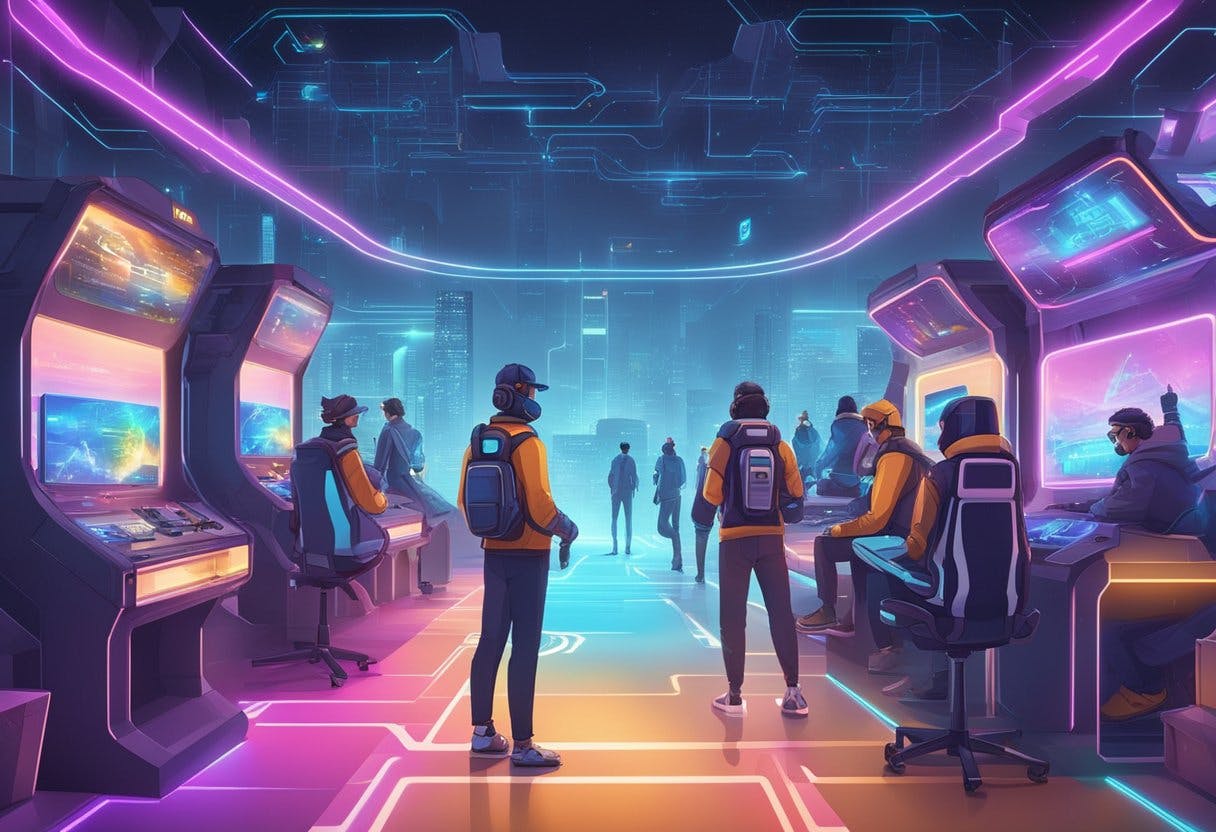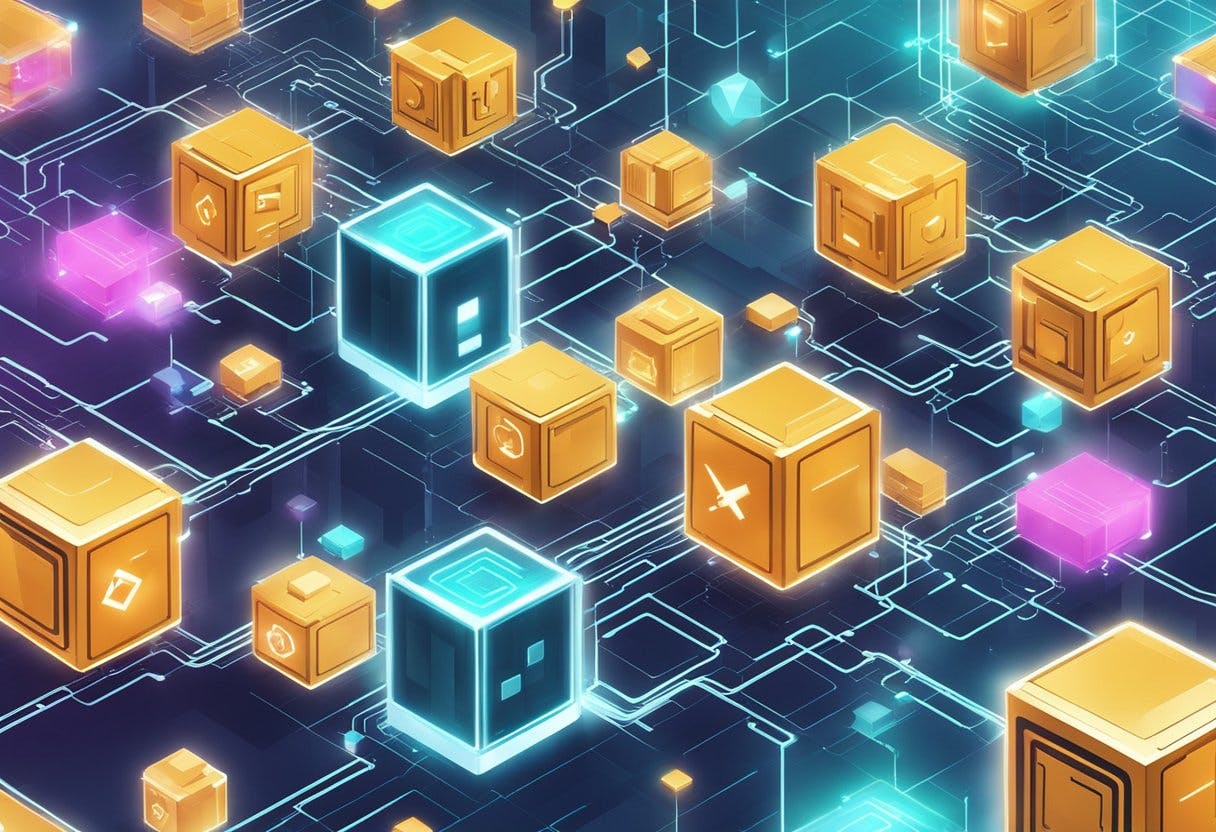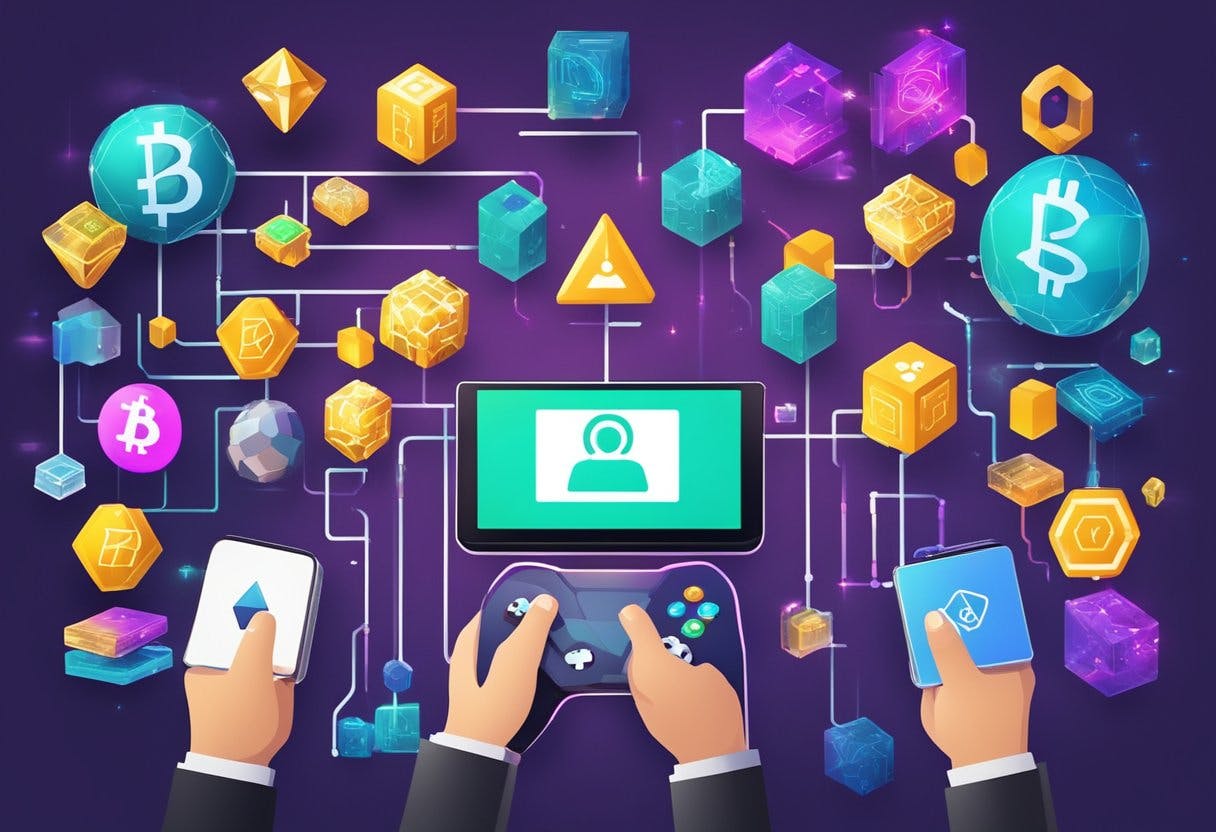
Blockchain technology has been making waves in various industries, and the gaming industry is no exception. The integration of blockchain in gaming has brought in a new era of gaming, where players can enjoy a more secure, transparent, and decentralized gaming experience. But it’s not just about fun and games anymore. The integration of blockchain in gaming has opened up new possibilities for monetization, ownership, and economy, creating a new ecosystem for gamers and developers alike.

The evolution of blockchain in gaming has been remarkable. From its humble beginnings in 2013 with the game Huntercoin, blockchain technology has come a long way. Today, there are hundreds of blockchain games, and the industry has grown exponentially, attracting millions of players worldwide. Blockchain gaming has become a new frontier for innovation, where developers can experiment with new game mechanics, monetization models, and ownership structures.
Understanding blockchain technology in gaming is crucial to realizing its potential. Blockchain technology provides a decentralized and transparent ledger that records all transactions and interactions within the game. This allows for the creation of unique digital assets, such as non-fungible tokens (NFTs), that can be owned and traded by players. Blockchain technology also provides a secure and tamper-proof system that prevents cheating, hacking, and fraud, creating a fair and trustworthy gaming environment.
Key Takeaways
- The integration of blockchain in gaming has opened up new possibilities for monetization, ownership, and economy, creating a new ecosystem for gamers and developers alike.
- Blockchain gaming has become a new frontier for innovation, where developers can experiment with new game mechanics, monetization models, and ownership structures.
- Understanding blockchain technology in gaming is crucial to realizing its potential, providing a decentralized and transparent ledger that records all transactions and interactions within the game.
The Evolution of Blockchain in Gaming

The integration of blockchain technology in the gaming industry has brought about revolutionary changes. By introducing features such as NFTs, cryptocurrencies, and decentralized systems, blockchain has created new economic models that have transformed how games are designed, played, and monetized.
From Traditional to Blockchain Games
Traditionally, game developers have maintained complete control over the games they create, from the game’s data to the in-game assets and currencies. Players have no ownership of the items they acquire in the game and cannot monetize them. However, with the advent of blockchain technology, players can now own their in-game assets and trade them on the open market.
Blockchain technology has introduced a new era of gaming, where players can earn real money by playing games. This has led to the emergence of the “Play-to-Earn” (P2E) model, where players can earn rewards for their time and effort spent in the game.
Key Milestones in Blockchain Gaming
The evolution of blockchain gaming has been marked by several key milestones. One of the first blockchain games was “CryptoKitties,” where players could buy, sell, and breed digital cats using Ethereum. This game popularized the concept of NFTs and demonstrated the potential of blockchain technology in gaming.
Another significant milestone was the launch of “Axie Infinity,” a blockchain-based game that allows players to earn money by breeding, battling, and trading creatures called “Axies.” The game has gained immense popularity, with players earning millions of dollars in revenue.
Blockchain technology has also enabled the creation of decentralized gaming platforms such as “Decentraland” and “The Sandbox,” where players can create, own, and monetize their virtual worlds.
In summary, the integration of blockchain technology in the gaming industry has brought about a new era of gaming, where players can own their in-game assets and earn real money. The evolution of blockchain gaming has been marked by several key milestones, including the emergence of NFTs, the P2E model, and decentralized gaming platforms.
Understanding Blockchain Technology in Gaming

Blockchain technology is transforming the gaming industry in many ways. It has the potential to change the way we play games, own and trade assets, and interact with other players. In this section, we will explore how blockchain enhances gaming experiences and the role of cryptocurrency and NFTs in gaming.
How Blockchain Enhances Gaming Experiences
Blockchain’s decentralized nature allows for the creation of trustless and transparent gaming environments. In traditional games, players must trust the game developers and publishers to ensure fair play, prevent cheating, and protect their assets. However, blockchain-based games use smart contracts to execute game logic and rules automatically, eliminating the need for intermediaries.
Moreover, blockchain technology enables players to truly own their in-game assets. In traditional games, players can buy and sell assets, but they do not truly own them. If the game shuts down, the assets become worthless. In contrast, blockchain-based games use non-fungible tokens (NFTs) to represent in-game assets, which are stored on the Ethereum blockchain. This means that players own their assets and can trade them on decentralized marketplaces, even if the game shuts down.
The Role of Cryptocurrency and NFTs
Cryptocurrency and NFTs play a significant role in blockchain-based games. Cryptocurrencies like Bitcoin and Ethereum are used as the primary means of exchange in crypto games. Players can earn cryptocurrency by playing games, completing quests, and competing with others. They can then use the cryptocurrency to buy in-game assets or trade them on decentralized marketplaces.
NFTs, on the other hand, are unique digital assets that represent ownership of in-game items. They are used to create rare and valuable items in games, which can be traded on blockchain-based marketplaces. NFTs have the potential to create new revenue streams for game developers and publishers, as players are willing to pay high prices for rare and unique items.
In conclusion, blockchain technology is transforming the gaming industry by creating trustless and transparent gaming environments, enabling players to truly own their assets, and creating new revenue streams for game developers and publishers. Cryptocurrency and NFTs play a significant role in blockchain-based games, providing players with a means of exchange and creating rare and valuable items. As blockchain technology continues to evolve, we can expect to see even more innovative and exciting use cases in the gaming industry.
Monetization and Economy in Blockchain Gaming

Blockchain gaming has introduced new ways of monetizing games and creating economies within them. The integration of blockchain technology in gaming has enabled the development of new business models that allow players to earn revenue from their in-game activities. In this section, we will discuss two major aspects of the monetization and economy in blockchain gaming.
Play-to-Earn Model
The play-to-earn model is a revolutionary concept in blockchain gaming that enables players to earn cryptocurrency or other digital assets while playing games. This model is made possible by the integration of blockchain technology, which enables the creation of unique in-game assets that can be traded on decentralized marketplaces. Players can earn these assets by completing in-game tasks, participating in tournaments, or simply by playing the game.
One of the most popular examples of the play-to-earn model is Decentraland, a blockchain-based virtual world that allows players to buy, sell, and trade virtual land using their cryptocurrency. Players can earn revenue by creating and monetizing content within the virtual world, such as games, experiences, and art installations. The Decentraland economy is powered by its native cryptocurrency, MANA, which is used for all in-game transactions.
Trading and Ownership of In-Game Assets
The integration of blockchain technology in gaming has also enabled the trading and ownership of in-game assets. These assets can be unique items, such as weapons, armor, and skins, or virtual real estate, such as land and buildings. Blockchain technology enables the creation of unique, verifiable, and transferable digital assets that can be bought, sold, and traded on decentralized marketplaces.
Immutable X is an example of a blockchain-based platform that enables the trading of in-game assets. The platform is built on Ethereum and uses a layer-two scaling solution to enable fast and secure transactions. Immutable X allows players to trade their in-game assets without the need for a centralized intermediary, such as a game publisher or marketplace. This gives players more control over their assets and enables them to profit from their in-game activities.
In conclusion, the integration of blockchain technology in gaming has introduced new ways of monetizing games and creating economies within them. The play-to-earn model and the trading and ownership of in-game assets are two major aspects of the monetization and economy in blockchain gaming. These concepts enable players to earn revenue from their in-game activities and give them more control over their assets.
Challenges and Solutions in Blockchain Gaming
Blockchain technology has the potential to revolutionize the gaming industry by offering new ways to monetize and reward players, increasing transparency, and enhancing security. However, the adoption of blockchain in gaming is not without its challenges. This section will explore some of the key challenges and solutions in blockchain gaming.
Scalability and Transaction Fees
One of the most significant challenges facing blockchain gaming is scalability. Blockchain networks such as Ethereum can only handle a limited number of transactions per second, making it difficult to support large-scale gaming applications. This can lead to slow transaction times and high transaction fees, which can make gaming on the blockchain prohibitively expensive.
To address these challenges, developers are exploring solutions such as layer-two scaling solutions, which can increase the capacity of blockchain networks without compromising on security. Another approach is to use sidechains or off-chain solutions to reduce the load on the main blockchain network.
Security and Regulation
Another challenge facing blockchain gaming is regulatory uncertainty and enhanced security. Given the decentralized nature of blockchain networks, it can be challenging to enforce regulations and ensure compliance with local laws. Additionally, blockchain networks are vulnerable to hacks and other security threats, which can compromise the integrity of the gaming experience.
To address these challenges, developers are exploring solutions such as smart contracts, which can help enforce rules and regulations on the blockchain network. Additionally, developers are exploring ways to enhance security by using advanced encryption techniques and other security protocols.
In conclusion, while blockchain technology offers many benefits for the gaming industry, there are also many challenges that need to be addressed. Developers are working hard to find solutions to these challenges, and as blockchain technology continues to evolve, it is likely that we will see more innovative solutions emerge in the future.
The Future of Blockchain Gaming
Emerging Trends and Predictions
The integration of blockchain technology in gaming has opened up new possibilities for the gaming industry. The future of blockchain gaming looks promising, with emerging trends and predictions showing that the industry will continue to grow and evolve.
One of the main trends is interoperability, which allows players to move assets between different games and platforms. This will create a more seamless and connected gaming experience for players. Another trend is transparency, which blockchain technology provides by enabling players to track the ownership and history of in-game assets. This will increase trust and reduce fraud in the gaming industry.
Investment in blockchain gaming is also expected to increase in the future. According to a report by Research and Markets, the global blockchain gaming market is expected to grow from $56 million in 2020 to $1.6 billion by 2026, at a CAGR of 57.2%. This growth is driven by the increasing adoption of blockchain technology in the gaming industry and the growing popularity of blockchain-based games.
Integrating Blockchain with Other Gaming Advances
The integration of blockchain technology with other gaming advances, such as virtual land and Illuvium, is also expected to shape the future of blockchain gaming. Virtual land, which is a virtual space that players can buy and sell using cryptocurrencies, is becoming increasingly popular in blockchain gaming. This allows players to create, own, and monetize their own virtual spaces in the game.
Illuvium, on the other hand, is a blockchain-based game that combines elements of monster-catching games and RPGs. It uses blockchain technology to create a decentralized game world where players can collect, trade, and battle creatures. The game’s native token, ILV, is used to buy and sell in-game assets and participate in governance.
In conclusion, the future of blockchain gaming looks promising with emerging trends and predictions showing that the industry will continue to grow and evolve. The integration of blockchain technology with other gaming advances will shape the future of blockchain gaming, creating a more seamless and connected gaming experience for players.
Frequently Asked Questions
What advantages do blockchain technologies offer to the gaming industry?
Blockchain technologies offer several advantages to the gaming industry. One of the most significant advantages is the ability to create a secure and transparent environment for gamers. The blockchain’s decentralized nature ensures that all transactions are recorded on a public ledger, making it impossible for anyone to cheat the system. Additionally, blockchain technology enables gamers to own their in-game assets, which can be bought, sold, or traded on a peer-to-peer basis. This creates a new revenue stream for gamers and enables them to monetize their gaming experience.
How might blockchain innovation transform the current gaming market?
Blockchain innovation has the potential to transform the current gaming market in several ways. First, it enables gamers to own their in-game assets, which can be traded on a peer-to-peer basis. This creates a new revenue stream for gamers and enables them to monetize their gaming experience. Second, blockchain technology enables game developers to create new revenue streams by offering in-game items, such as skins, weapons, or other virtual goods, that can be sold to gamers. Finally, blockchain technology can create a more secure and transparent gaming environment, which can help prevent fraud and cheating.
What potential risks should be considered when integrating blockchain into gaming platforms?
Integrating blockchain into gaming platforms comes with some potential risks. One of the most significant risks is the potential for hacking and fraud. Blockchain technology is still relatively new, and there are still some vulnerabilities that hackers can exploit. Additionally, blockchain technology can be complex, and integrating it into gaming platforms can be challenging. Finally, there is a risk that gamers may not be interested in owning their in-game assets, which could limit the potential revenue streams for game developers.
How has blockchain technology influenced the business models of gaming companies?
Blockchain technology has influenced the business models of gaming companies in several ways. First, it has created new revenue streams for gamers and game developers. Second, it has enabled game developers to create a more secure and transparent gaming environment, which can help prevent fraud and cheating. Finally, blockchain technology has enabled game developers to create new in-game items, such as skins, weapons, or other virtual goods, that can be sold to gamers.
What is the estimated market size of the blockchain gaming sector?
The blockchain gaming sector is still relatively new, and there is no exact estimate of its market size. However, according to a report by MarketsandMarkets, the blockchain gaming market is expected to grow from $56 million in 2019 to $1.6 billion by 2024, at a compound annual growth rate (CAGR) of 82.4%.
In what ways is the Blockchain Gaming Alliance contributing to the development of blockchain in gaming?
The Blockchain Gaming Alliance is a non-profit organization that is dedicated to promoting the adoption of blockchain technology in the gaming industry. The Alliance is working to establish standards for blockchain-based gaming platforms, promote the use of blockchain technology in the gaming industry, and provide education and resources to game developers and gamers. The Alliance is also working to create a more secure and transparent gaming environment, which can help prevent fraud and cheating.
Read More




